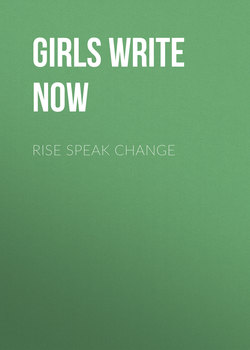Читать книгу Rise Speak Change - Girls Write Now - Страница 19
На сайте Литреса книга снята с продажи.
ОглавлениеWe Protest with Thunder, Not Lightning
SOLEDAD AGUILAR-COLON
This piece critiques the way people of color are treated by police when protesting for their rights and contrasts how white people are treated when protesting.
It was like lightning. The bright flash of cameras was blinding as our adolescent faces appeared on their screens. We were seen, but never really heard. We might as well have been silent. My friend and I walked hand in hand, my fingers tugging on hers. Turn right, I tugged her thumb, avoid the dog, turn left I tugged her pinky. Avoid the book bags, they whispered. My fingers clench around her slippery wrist. Stop, they say. I want to make sure she’s okay, but her name slips from my tongue like raindrops and emerges into the puddle underneath our trembling feet. Ixchel reminded me of the Puerto Rican drink my grandmother makes during the holidays so she can drink away her ex-husband; her special eggnog with un chin de rum, we call it coquito. When I look at her hair, it’s anything but the strong independent black curls I had connected with the first moment we met. They were instead pressed down by the heavy pour of rain. They were straight for now and the ends of her hair seemed to be held down by a hot iron plank. They reminded me of prison bars. When I think of Ixchel and me, the color of our skins have never stood out so vividly; eggnog with a hint of rum fading away against the untouched snowflake white.
The voices of the protesters made noise, but delivered no message as we marched with our soaking wet book bags toward the Trump Towers on Fifty-Sixth Street and Fifth Avenue. I jerk at the sound of a hundred geese screeching as it fills my eardrums and I turn around to see a line of cars honking at the sight of our ostentatious signs that read, “Fuck Trump” and “Pussy Grabs Back.” Puddles splash at our feet, causing teenagers to glance down at their wet corporate American Apparel jeans in dread. They worried because the jeans cost fifty dollars, but never about how only ten dollars or less of that is given to the workers in China and India that make those jeans. They were protesting for the rights of working class, people of color, but never came to question how they are instead supporting the exploitation of people of color through their purchase of certain brands. The irony of leaving education to protest without being educated about what we were protesting. I thought of the abruptness of my decision to skip school because I had the ability to, but what if our education was our means of resistance? For Malala, she fought with a pen, paper and books and was effective in generating change. We were uneducated protestors, so why protest at all?
I tap Ixchel on the shoulder to let her know of the instant publicity that the protest was attracting through the multiple snapchat videos and flashing cameras trained on our faces. Police officers were offering their hands to us and we walked across the street. Together. When we reached the Trump Towers, the officers put metal barricades around us. I soon realized they weren’t corralling us; they were keeping everyone else out because as newspapers would later write, this march of four hundred mostly privileged white students was peaceful. However, newspapers never deem protests as peaceful, so why us?
Six months earlier, I was filled with overwhelming pride as multiple fists ranging in colors from warm brown rice to sharp black pepper and spicy red curry rose in the air. The blood of our enslaved and undocumented ancestors, our history of broken backs and cracked feet spilled out on the clean “cookie-cutter” rugs of the New School building. I felt the shudder of the strong woman next to me as we breathed in and out as one, frightened of what was to come. We walked toward Grand Central Station with foreheads drenched in salty sweat and sticky lemonade fingers as red-faced men screamed “Sluts!” and “Put some clothes on!” Some mothers raised their fists in a salute to our anti-slut-shaming protest; others covered their daughters’ eyes, shielding them from the free women of color fighting for their future. We didn’t avert our eyes from the gaze of our zookeepers; we stared it in the face and unchained ourselves. At Grand Central Station, we screamed. We were thunder, demanding to be heard. A group of twenty women, hands linked in solidarity. Together we were no longer forced into their straight-jackets that typecast us; we reclaimed a meaning that was inclusive of our power as young women of color. Cameras flashed and everyone stopped to admire the young women they thought belonged in zoos. Our skin glowed with all of the colors of the rainbow and every flag across the globe. Police officers just had to shut it down. Twenty cops, one for each of us, came down to tape our lips together, but we didn’t need to speak in order to stand out. We were like thunder, no longer seen, but heard. As the chief of the NYPD tells us that we were disturbing the peace and we have to leave in an orderly fashion, we stick up our middle fingers and chant, “We have nothing to lose but our chains.”
